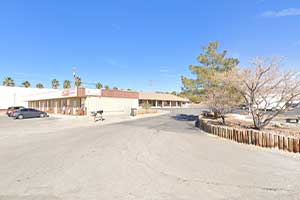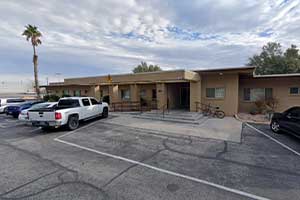Skip To Rehab Listing
However, for people struggling with drug and alcohol abuse problems, Pahrump can also offer workable solutions in the form of 25 drug and alcohol rehab programs designed to help clients in their treatment.
Drug and Alcohol Treatment Approaches and Settings
Pahrump area residents who struggle with alcohol and drug addiction have multiple rehab settings available to them, including the following: outpatient substance abuse counseling, inpatient detox centers, short term drug addiction treatment, long term drug rehab programs, inpatient drug and alcohol rehab centers.
These treatment programs make alcohol and drug rehab easy to access, with convenient locations and numerous different treatment modalities from which to choose, including those listed here: dual diagnosis drug rehab, motivational interviewing, activity therapy, relapse prevention, group therapy, brief intervention approach.
Special Programs for Drug and Alcohol Recovery
Substance abuse impacts every individual differently. In order to address these differences and offer more tailored treatment, addiction treatment programs in Pahrump provide several special programs for [patients such as: suicide prevention services, substance abuse education, co-occurring mental and substance abuse disorders, domestic violence, residential beds for client's children, child care for clients children.
Patients who believe they may need these special programs can discuss them with the treatment center in order to receive help that is designed to maximize the chances of lasting sobriety.
Treatment Payment Alternatives
Residents of Pahrump come from differing financial circumstances, making it vital for rehab programs to deliver multiple payment alternatives that place rehabilitation within financial reach. Clients can expect to get payment alternatives at nearby alcohol and drug rehab programs such as the following: private pay, private health insurance, sliding fee scale, payment assistance, state corrections or juvenile justice funds, access to recovery (atr) voucher.
Despite a patient's financial situation, money should not be a barrier to treatment. Addiction treatment programs guide individuals through their payment alternatives and help them find a way to pay for their rehab.
The goal of varied treatment centers, methods, programs, and payment alternatives is that treatment for drug and alcohol addiction is possible for as many individuals who need it.
Commonly Asked Questions about Addiction and Treatment
What you should do and how to cope if you are living with an addict?
Living with an individual struggling with addiction can be challenging and emotionally taxing. It's essential to find effective strategies to cope with this situation, protect your own well-being, and potentially influence your loved one towards recovery. Here are some strategies:
- Educate Yourself: Understand that addiction is a disease, not a choice or moral failing. Learn about the specifics of the addiction, its effects, and treatment options. This knowledge can help you better empathize with your loved one and give you an idea of what they're facing.
- Set Boundaries: Establish boundaries that protect your mental, emotional, and physical health. This could involve rules around drug use in the house, or not covering for the addict's responsibilities. Be firm in maintaining these boundaries.
- Avoid Enabling: While it can be difficult to watch a loved one suffer, avoid actions that enable their addiction, such as providing money that may be used on drugs or alcohol, or making excuses for their behavior.
- Communicate Openly and Honestly: Express your concerns without blame or judgment. Use "I" statements to express how their behavior affects you and others in the house.
- Encourage and Support Treatment: Encourage them to seek professional help. Show support for their efforts to engage in treatment and maintain recovery.
- Take Care of Yourself: It's crucial to look after your own health too. Make time for activities you enjoy, maintain a healthy lifestyle, and seek support when needed. You cannot pour from an empty cup, so ensure you're well-equipped mentally and physically to cope with the situation.
- Seek Support: Consider joining a support group for families and friends of individuals with addiction, such as Al-Anon or Nar-Anon. These groups can provide a community of people who understand your experiences and can provide advice, support, and a safe space to share your feelings.
- Consider Professional Guidance: If the situation becomes unmanageable or you're unsure how to proceed, seek help from a counselor or therapist familiar with addiction. In extreme cases, a professional intervention may be necessary.
How to help an addict without enabling them?
Helping an individual struggling with addiction without enabling them requires a fine balance. Here are some strategies that might be helpful:
- Understand the Difference between Helping and Enabling: Helping involves actions that promote recovery and responsibility, while enabling involves actions that indirectly support or condone the addictive behavior. For example, providing money without accountability might support the purchase of substances, which would be enabling. Instead, directly paying for a necessity like rent or an utility bill could be a more supportive choice.
- Set Boundaries: Establish clear rules and expectations for behavior. These could involve no drug use at home, or consequences for missed commitments. Consistency is important when enforcing these boundaries.
- Encourage Treatment: Continually encourage your loved one to seek professional help for their addiction. You could assist by researching treatment options or helping to arrange appointments, but the decision to follow through must ultimately be theirs.
- Offer Emotional Support: Provide reassurance, empathy, and love. This kind of support fosters a sense of self-worth, which can be a motivating factor for seeking treatment.
- Avoid Covering Up for Their Addiction: Do not lie or make excuses for their behavior. This can perpetuate the cycle of denial and avoid the necessary realization of the harmful effects of their addiction.
- Practice Self-Care: Caring for someone with an addiction can be emotionally draining. Be sure to take care of your own health and wellbeing, seeking outside support if needed.
- Educate Yourself: Learning about the nature of addiction can help you respond more effectively. Consider attending support group meetings for friends and family members of people with addiction, such as Al-Anon or Nar-Anon.
- Support Recovery, Not Addiction: Be mindful of any actions that may unintentionally support the addiction rather than the person. This could involve refusing to provide money that could be used on substances, while instead offering help in forms that directly support recovery, like providing transportation to therapy sessions.
Top reasons that drug and alcohol abusers in recovery relapse?
Relapse is a common part of the recovery journey for many individuals struggling with substance abuse. It's important to note that a relapse doesn't mean treatment has failed; rather, it indicates that the treatment plan needs to be revisited or adjusted. Here are some of the top reasons why individuals in recovery might relapse:
- Stress: High levels of stress can trigger a return to substance use as a coping mechanism.
- Lack of Support System: A strong support system is crucial in maintaining sobriety. Lack of emotional support and understanding from friends and family can contribute to relapse.
- Triggers and Temptations: Being in environments or around people associated with past substance use can act as triggers, leading to a desire to use again.
- Unresolved Psychological Issues: Mental health conditions, such as depression, anxiety, or trauma, can lead to a relapse if they're not effectively treated.
- Overconfidence: Some individuals may become overconfident and believe they can control their substance use without professional help, leading to a relapse.
- Poor Self-Care: Neglecting physical health, skipping meals, lack of sleep, and not taking care of oneself in general can contribute to a relapse.
- Incomplete Treatment: Leaving a treatment program before it is completed can leave individuals ill-prepared to resist the urge to use substances.
- Not Having a Plan: If an individual does not have a clear plan for dealing with cravings or triggers, they are more likely to relapse when confronted with these challenges.
- Challenging Emotions: Negative emotions like anger, sadness, loneliness, and frustration can sometimes lead to a desire to return to substance use as a way to escape.
- Celebrations or Positive Events: Surprisingly, positive events or celebrations can also trigger a relapse. The association of substance use with celebration or reward can lead to the temptation to use.














